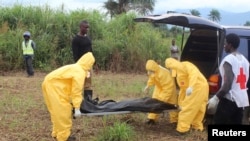The emergency Ebola committee of the World Health Organization has again come out against bans on travel and trade with the countries where the virus is wreaking the greatest havoc. The committee of experts says this will not stop the spread of Ebola.
The Emergency Committee declared Ebola a "public health emergency of international concern" when it held its first session in August. Since then, the epidemic has worsened significantly in Guinea, Sierra Leone, and Liberia and has spread to Nigeria, Senegal, the United States and Spain.
Latest WHO figures put the number of Ebola cases at 9,936 cases, including 4,877 deaths - all but a few of them in the three West African countries.
In its latest assessment of the epidemic, released Thursday, the Emergency Committee emphasized the importance of stopping transmission of Ebola within the three main countries as the best way of preventing further international spread.
The committee rejected calls for a general ban on international travel or trade as being both ineffective and counter productive.
But WHO Director of Global Capacities, Isabelle Nuttall, said the committee stood by its previous recommendation that people who were sick with Ebola or have been in contact with patients in the last 21 days should not leave their country.
“They provided some explanation as to why they would not recommend a general travel ban, explaining that this would be likely to cause economic hardship and could consequently increase the uncontrolled migration of people from affected countries, therefore raising the risk of international spread of Ebola,” said Dr. Nuttall.
The committee also emphasized the need to reduce the isolation and economic hardship of the affected countries by normalizing air travel and the movement of ships.
Liberia, Sierra Leone, and Guinea have exit screening measures in place at their airports. But, a number of countries now have introduced entry-screening measures in an effort to keep out Ebola. This includes the United States, which recently had its first imported case of Ebola from Liberia.
Dr. Nuttall said little was known about the effectiveness of such a measure and called for countries implementing entry screening to share their experiences and information.
“It was noted by the committee that entry screening may have a limited effect in reducing international spread when added to exit screening. So, its advantages and disadvantages should be carefully considered,” she said.
The Emergency Committee also recommended that countries not cancel international meetings and mass gatherings. It said it recognizes these are complex decisions and said they must be decided on a case-by-case basis.




